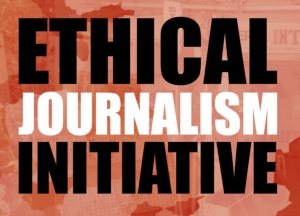
Region: EU
Around 50 participants, including national and regional journalists, representatives of civil society groups and minority groups and government representatives took part in the two-day debate organised on 7 – 8 November by the Slovak Syndicate of Journalists (SSN) on journalism ethics, media diversity, minority rights and discrimination issues.

The conference is parts of the 18-month campaign on Ethical Journalism Initiative (EJI) in Europe, run in partnership with the European Federation of Journalists, Article 19, Media Diversity Institute and three European journalists’ associations.
A number of journalists from neighbouring countries: Poland, Serbia, Ukraine and Hungary, participated in the meeting and shared their experience in reporting minority issues around the region.
Participants identified major threats facing journalists in Slovakia. These threats mainly come from the government, politicians, media owners with a commercial interest over editorial independence, and the precarious working conditions facing journalists, particularly young journalists.
The conference also highlighted a division between senior journalists and younger journalists; the latter generally accept lower payment and lesser editorial independence. It creates a competition among these two groups and the generation gap is widening. Participants expressed that there is a need for more training and education for both young and old journalists; in particular, young journalists need to be informed about their rights and responsibilities.
Representatives of the Slovakian Press Council presented the work of the council and the difficulties it is facing. The council is not widely recognised by the public and government institutions. It has little legitimacy when it comes to enforcing its decisions. It also lacks resources and financial support to maintain its work. Publishers and media organisations are reluctant to cooperate with the council and union.
Pointing to the fact that no representative from publishers or media owners present in the conference, the representative of the Cultural Ministry in Slovakia, Natasa Slavikova, called for more dialogues and cooperation with publishers and media owners.
When discussing the media coverage of minority groups in Slovakia, a division of editorial choice between regional and national media emerged. Most participants pointed to the fact that national media generally resort to sensational journalism when covering minority issues due to commercial pressure.
Nevertheless, a robust local media exists and is committed to fair reporting of minority issues in Slovakia but they struggle to maintain its service due to limited financial resources. They struggle to “sell” these stories to national newspapers because of different news agenda. Journalists and local media managers shared their experiences with minority groups in Slovakia and showed their works to participants documenting the problems facing minority groups and immigrants in their own communities.